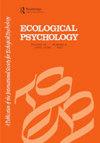An Emerging Developmental Ecological Psychology: Future Directions and Potentials
IF 1.7
3区 心理学
Q3 PSYCHOLOGY, EXPERIMENTAL
引用次数: 13
Abstract
ABSTRACT This article explores the relation of ecological perceptual research on infancy to adult Ecological Psychology, including contrasts between the ideas of invariants for perception and distinctive features that are the basis of perceptual learning. We concentrate on relations between development and learning and go on to elaborate principles of Ecological Psychology (as presented in Michaels & Palatinus, 2014) into developmental principles. As a result of this analysis, we stress that researchers must at least indicate how results relate to the organism-environment system at the level of the organism. We go on to present Goethe's work in morphology that stresses transformation as the key to development as a resource for theorizing and researching organismic development. This approach goes beyond “snapshots” at any one point in time and beyond any simple linear or additive model of change over the life span. We then draw on recent developments in organicism in biology (cf. Gilbert & Sarkar, 2000) to distinguish levels of functioning in living organisms, again with an eye to organismic functioning. Finally, we propose that these various branches of biology are potential resources for a psychology committed to ecology, that is, organism-environment mutuality existing over time and in all settings.一个新兴的发展生态心理学:未来的方向和潜力
摘要本文探讨了婴儿期生态感知研究与成人生态心理学的关系,包括感知不变量的思想与作为感知学习基础的独特特征之间的对比。我们专注于发展和学习之间的关系,并将生态心理学的原则(如Michaels&Palatinus,2014所述)阐述为发展原则。作为这一分析的结果,我们强调,研究人员至少必须指出结果与生物体层面的生物体环境系统之间的关系。我们继续介绍歌德在形态学方面的工作,强调转化是发展的关键,是理论和研究组织发展的资源。这种方法超越了任何一个时间点的“快照”,也超越了任何简单的线性或加性的寿命变化模型。然后,我们利用生物学中有机主义的最新发展(参见Gilbert和Sarkar,2000)来区分活生物体的功能水平,再次着眼于生物体的功能。最后,我们提出,生物学的这些不同分支是致力于生态学的心理学的潜在资源,也就是说,随着时间的推移,在所有环境中都存在着有机体与环境的相互关系。
本文章由计算机程序翻译,如有差异,请以英文原文为准。
求助全文
约1分钟内获得全文
求助全文
来源期刊

Ecological Psychology
PSYCHOLOGY, EXPERIMENTAL-
CiteScore
3.30
自引率
10.50%
发文量
8
期刊介绍:
This unique journal publishes original articles that contribute to the understanding of psychological and behavioral processes as they occur within the ecological constraints of animal-environment systems. It focuses on problems of perception, action, cognition, communication, learning, development, and evolution in all species, to the extent that those problems derive from a consideration of whole animal-environment systems, rather than animals or their environments in isolation from each other. Significant contributions may come from such diverse fields as human experimental psychology, developmental/social psychology, animal behavior, human factors, fine arts, communication, computer science, philosophy, physical education and therapy, speech and hearing, and vision research.
 求助内容:
求助内容: 应助结果提醒方式:
应助结果提醒方式:


